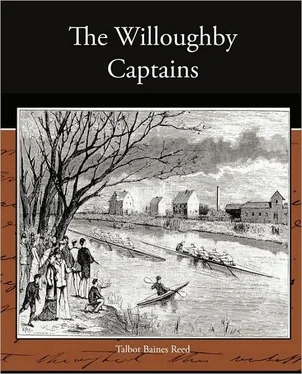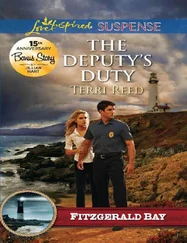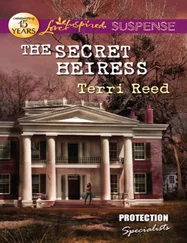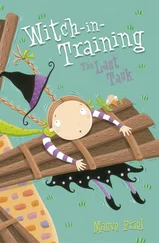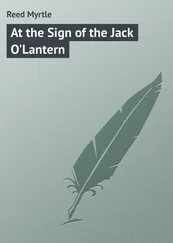Porter was not a good speaker, and the little he did say was a good deal bungled. Still there was a manly ring about his speech which pleased the better disposed section of his audience, some of whom did not even belong to the same house.
Silk followed. The Welcher monitor was clever to a certain degree, and although he never chose to devote his cleverness to good purposes, he usually managed to get himself listened to when he chose to take the trouble. And at present, his peculiar position as the deposed head of Welch’s gave a certain interest to what he had to say. Bitter enough it was.
“What chance is there of the school not going down, I should like to know,” said he, “when cant is the order of the day? (Hear, hear.) Of course the school is going down. What interests can any one have in his house when some one comes and begins by setting the juniors against the seniors and then turning up the whites of his eyes and saying, ‘What a shocking state of disorder the house is in?’ Why, before ‘the little stranger’—(loud laughter) — came to Welch’s, the seniors and juniors never fell out,” (“Hear, hear,” from several quarters), “but now there’s a regular mutiny. And what’s bad for one house is bad for the school. I don’t care who’s head of Welch’s. He’s welcome to the honour if he likes, but let him act above-board, that’s what I say, and not snivel and look pious while all the time he’s doing a dirty trick.” (Cheers from Tucker and one or two more, which, however, instantly died out when Crossfield rose.)
Crossfield was the plague of the senior Welchers’ lives!
“I was much affected by the beautiful speech of the gentleman who has just sat down,” he began. “It is always so sweet to hear conscious innocence asserting itself. After the gentleman’s noble efforts for the good of his house (laughter) — and the splendid example he has set of rectitude — (laughter) — and high moral principle — (laughter) — it is truly touching to find him put on one side for an interloper who is villainous enough to tell the juniors they need not walk in his saintly footsteps! (Laughter.) But that is not what I wanted to say, and as the gentleman appears to be overcome by his emotions — (Silk was at that moment angrily leaving the room) — I don’t think we need trouble any more about him. (Cheers and laughter.) All I wished to say was this: I always understood from the gentlemen of Parrett’s that Mr Bloomfield was captain of Willoughby,” (Loud cries of “So he is!”), “and that nobody cared a straw for Mr Riddell.” (“No more they do!”). “Then, I don’t think Mr Ashley is very complimentary to Mr Bloomfield when he says the fault of all the mischief is that the captain is not an all-round man. For all that he’s quite correct. Mr Bloomfield is a well-meaning man, no doubt, but he certainly is not an all-round man.” (Uproar.)
Riddell then rose, and his rising was the signal for a great demonstration of party feeling. Parrett’s of course went against him, and a large section of Welch’s, but the schoolhouse, aided by Cusack, Pilbury, and Co., backed him up. He spoke nervously but boldly.
“I am sorry to have to support the motion of Mr Ashley. I agree with him that Willoughby is not what it was, and not what it should be. (Cheers.) And I also agree with him in thinking that the school might have a good deal better captain than it has.” (Cries of “No!” from the schoolhouse.) “However, I do not want to say a word about myself. What I do want to say is this — it’s one thing to discover that we are degenerate, and another to try to put ourselves right again. And are we likely to do that as long as we are all at sixes and sevens, pulling different ways, caring far more about our own gratifications than the good of the whole school? I don’t think so, and I don’t believe Mr Bloomfield does either. Every fellow worth the name of a Willoughbite must be sorry to see things as they are. (Hear, hear.) Why should they remain so? Surely the good of the school is more important than squabbling about who is captain and which is the best house. Of course, we all back up our own house, and, as a Welcher now, I mean to try if our house can’t give a good account of itself before the term’s over. (Loud cheers from Pilbury, Cusack, Philpot, etcetera.) And if each house pulls itself up, not at the expense of a rival house — (Hear, hear) — but for the glory of the school — (Hear, hear) — we shan’t have to complain of Willoughby being degenerate much longer. You remember what old Wyndham said the night before he left. As long as the fellows think first of the school and then of themselves Willoughby will be all right. Depend upon it he was right. We cheered him loud enough then, why not take his advice still?” (Loud cheers.)
This spirited address roused the applause of all the better-minded section, whose cheers were not wholly unmingled with self-reproach. Bloomfield himself, it was plain, felt its force, and as to the more vehement members of Parrett’s, it considerably damped their ardour.
“Old man,” said Fairbairn that evening to his friend the captain, “you struck a really good blow for the school this afternoon. I don’t know how you managed to pitch on just the right thing to say, as you did. Things will come all right, take my word for it. They’re beginning already.”
Alas, there is many a slip ’twixt the cup and the lip, as Willoughby had yet to discover.
Chapter Twenty
Is Willoughby Mad?
Things did not mend all at once at Willoughby. No one expected they would. And within a few days after the “debate in Parliament” it seemed as if the school had finally abandoned all ideas of order and discipline.
The reader will remember that more than once mention had been made of an approaching election for the free and enlightened borough of Shellport, which was occupying the attention not only of the town, and of the doctor and his ladies, but also of the boys themselves. And the cheers with which Morrison’s notice of motion, mentioned in the last chapter, was received, showed plainly enough how things were going.
By long tradition Willoughby had been a Whig school. Fellows did not exactly know what Whig meant, but they knew it was the opposite of Tory on one side and Radical on the other, and they went accordingly. On the present occasion, moreover, they had a sort of personal interest in the event, for the Whig candidate, Sir George Pony, had been discovered to be a sort of second uncle a few times removed of Pringle, one of the Parrett’s fags, whereas the Radical, Mr Cheeseman, was a nobody!
For all these reasons Willoughby felt it had a great stake in the contest, and tacitly determined to make its voice heard.
Small election meetings were held by the more enthusiastic politicians of the school, for the purpose of giving vent to their anti-radical sympathies. At these one boy was usually compelled to represent the Whig and another to figure as the unpopular Radical. And the cheering of the one and the hooting of the other was an immense consolation to the young patriots; and when, as usually happened, the meeting proceeded to poll for the candidates, and it was announced that the Whig had got 15,999 votes (there were just 16,000 inhabitants in Shellport), and the Radical only one (polled by himself), the applause would become simply deafening.
Even the seniors, in a more dignified way, took up the Whig cause, and wore the Whig colours; and woe betide the rash boy who sported the opposition badge!
The juniors were hardly the boys to let an occasion like this slip, and many and glorious were the demonstrations in which they engaged. They broke out into a blaze of yellow, and insisted on wearing their colours even in bed. Pringle was a regular hero, and cheered whenever he showed his face; whereas Brown, the town boy, whose father was suspected of being a Radical, was daily and almost hourly mobbed till his life became a burden to him. All other distinctions and quarrels were forgotten in this enthusiastic and glorious outburst of patriotic feeling.
Читать дальше
